Global leaders offered competing visions on how to tackle climate change at UN-led talks as a new report warned that the world must reach carbon neutrality much sooner than planned.
The report came as leaders gathered in Azerbaijan for COP29 climate talks aimed at reaching a deal to boost funding for poorer nations so they can adapt to climate shocks and transition to cleaner energy.
The chief aim of the conference is to secure a wide-ranging international climate financing agreement that ensures up to trillions of dollars for climate projects. Developing countries are hoping for big commitments from rich, industrialised nations that are the biggest historical contributors to global warming, and some of which are also huge producers of fossil fuels.
"The time window is narrowing, shrinking - and we need to act urgently," Yalchin Rafiyev, Azerbaijan's lead negotiator for COP29, told AFP.
"There are still possibilities for keeping 1.5C within reach", and striking a deal on climate finance "will definitely pave the way for us to realise this opportunity".
COP29 negotiators welcomed a pledge by major development banks to lift funding to poor and middle-income countries struggling with global warming as a nearly boost to the two-week summit.
A group of lenders, including the World Bank, announced yesterday a joint goal of increasing this finance to $120 billion by 2030, a roughly 60% increase on the amount in 2023.
"I think it's a very good sign," Minister Eamon Ryan told Reuters.
"It's very helpful. But that on its own won't be enough", Mr Ryan said, adding countries and companies must also contribute.
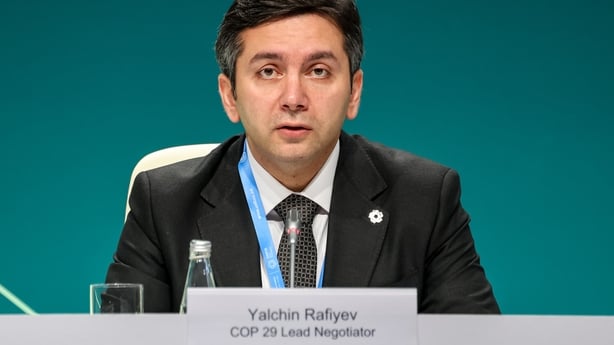
Mr Ryan's view was echoed by Patrick Verkooijen, CEO of the Global Center on Adaptation who welcomed the announcement as "a shot in the arm for the climate finance discussion"
"But there is so much more work ahead," he added.
Hopes for a strong deal have been dimmed by Donald Trump's US election win last week.
The US president-elect has promised to again withdraw the US from international climate cooperation.
The United States is already the world's largest oil and gas producer and Mr Trump has vowed to maximise output.
Officials representing President Joe Biden's outgoing administration at COP29 have said China and the European Union may need to pick up the slack if Washington cedes leadership.
"Developed countries have not only neglected their historical duty to reduce emissions, they are doubling down on fossil-fuel-driven growth," said climate activist Harjeet Singh.
Wealthy countries pledged in 2009 to contribute $100 billion a year to help developing nations transition to clean energy and adapt to the conditions of a warming world.
But those payments were only fully met in 2022 and the pledge expires this year.
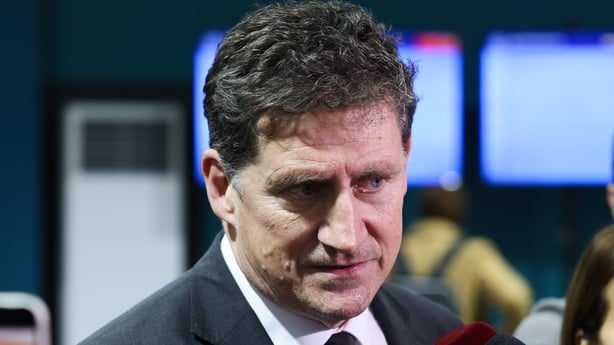
Record high
It comes as The Global Carbon Budget report, published during COP29, said global CO2 emissions are set to total 41.6 billion metric tons in 2024, up from 40.6 billion tons last year.
The bulk of these emissions are from burning coal, oil and gas. Those emissions would total 37.4 billion tons in 2024, up by 0.8% in 2023, the report said.
This represents a record high, according to the report.
The rest are from land use, a category that includes deforestation and forest fires. The report by more than 80 institutions was led by the University of Exeter in Britain.
"We don't see a sign of fossil fuel emissions peaking in 2024," said lead author Pierre Friedlingstein, a climate scientist at the University of Exeter.
Without immediate and steep emissions cuts worldwide, "we will just go straight into the 1.5C target, we'll just pass it and continue," he said.
Countries agreed under the 2015 Paris Agreement to try to stop global temperatures rising more than 1.5C (2.7 degrees Fahrenheit) to avoid climate change's worst impacts.
This would require steep emissions cuts every year from now until 2030 and beyond.
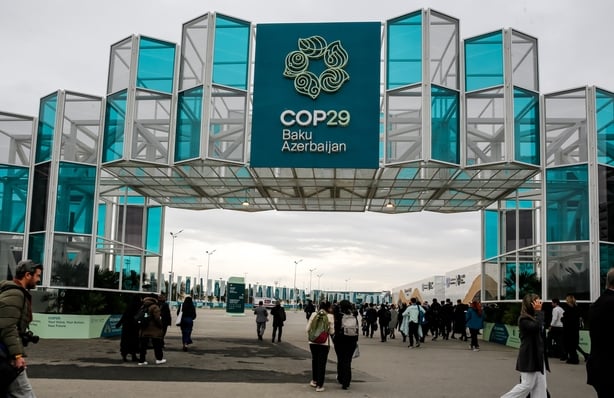
Instead, fossil fuel emissions have climbed over the last decade. Land use emissions had declined in this period - until this year, when a severe drought in the Amazon caused forest fires, driving up annual land use emissions by 13.5% to 4.2 billion tons.
Some scientists have said such slow progress means the 1.5C aim can no longer realistically be met.
This year's emissions data showed evidence of some countries rapidly expanding renewable energy and electric cars, the authors said.
Progress, however, was sharply uneven - with rich industrialised nations' emissions decreasing, and emerging economies' emissions still rising.
Tensions between nations erupted yesterday at COP29 over who should lead the world's transition away from fossil fuels - which produce around 80% of global energy.
COP29 host Azerbaijan's President Ilham Aliyev accused Western countries of hypocrisy for lecturing others while still being major consumers and producers of fossil fuels.
Emissions in the US, the world's top oil and gas producer and consumer, are expected to decrease by 0.6% this year, while European Union emissions are set to fall by 3.8%.
Meanwhile, India's emissions will rise by 4.6% this year, driven by soaring power demand fuelled by economic growth.
Emissions in China, today the world's biggest emitter and second-largest oil consumer, are set to marginally increase by 0.2%. The authors said China's emissions from oil use have likely peaked, as electric vehicles gain market share.
Emissions from international aviation and shipping are also expected to jump by 7.8% this year, as air travel continues to recover from a drop in demand during the Covid-19 pandemic.
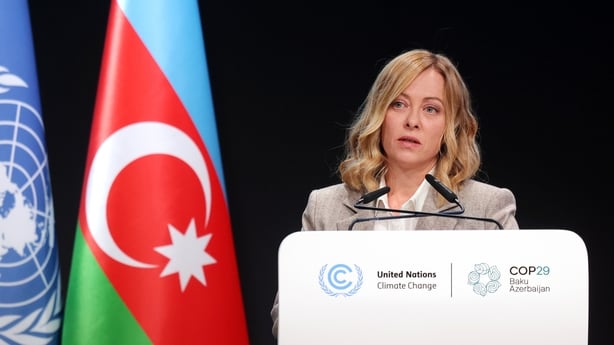
Italian Prime Minister Georgia Meloni has told COP29 delegates that efforts to reduce greenhouse gas emissions must put people at its core and consider the sustainability of production and social systems.
She said an approach that is too ideological and not pragmatic could backfire and that nature must be protected with man at its core.
"We know that we may not personally benefit from the results of the efforts that we are making (at COP29). But this is not important.
"I'm a mother. And as a mother, nothing gives me more satisfaction that when I work for policies that will enable my daughter and her generation to live in a better place," she said.
The French ecology minister said that she would not go to the COP29 climate talks in Azerbaijan because of its leader's "unacceptable" attacks on France.
"The comments made by President (Ilham) Aliyev at the opening of COP29 in Baku against France and Europe are unacceptable," Agnes Pannier-Runacher told French lawmakers after Aliyev blasted France's "crimes" in its overseas territories, including its troubled Pacific archipelago, New Caledonia.
Greek Prime Minister Kyriakos Mitsotakis said Europe is a global leader in the green transition but also needs to make sure there are more resources to tackle the impact of unprecedented climate shocks.
The world's largest economies have pledged to transition to net-zero carbon emissions energy systems by 2050.
"We cannot focus so much on 2050 that we forget 2024," Mr Mitsotakis told COP29.
"We need more resources to prepare to respond in time, in order to save lives and livelihoods and to help people and communities rebuild after disaster."
With abundant sun and wind, Greece has more than doubled its renewable energy output since 2014 to account for about half of its power generation and says it is on track to shut all its coal-fired plants by 2028.
But it has been at the frontline of the climate change and has struggled to provide relief and repair damage following destructive floods and wildfires in recent years, which scientists link to global warming.
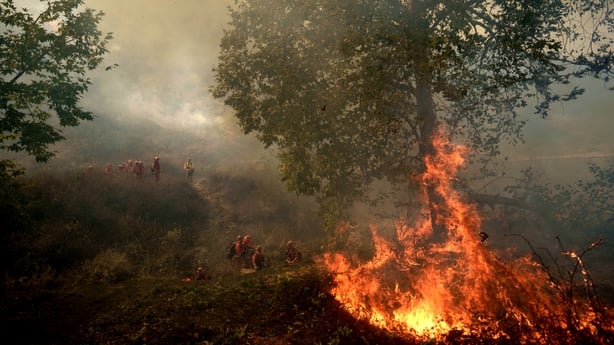
This year, the country had its hottest summer on record after a winter with little or no rain.
Mr Mitsotakis said Europe accounted for a diminishing share of global emissions but was almost alone in defending the rules of free trade and should make sure that the energy transition will not hurt its economy.
"We need to ask hard questions about a path that goes very fast at the expense of our competitiveness, and a path that goes somewhat slower but allows our industry to adapt and to thrive. It is our responsibility to weigh these trade offs carefully," he said.
Despite robust power generation from renewables in the summer, Greece had soaring wholesale electricity prices which it attributed to Europe's internal power market distortions and insufficient power links with central Europe, and asked the European Union for an urgent response.
We need your consent to load this rte-player contentWe use rte-player to manage extra content that can set cookies on your device and collect data about your activity. Please review their details and accept them to load the content.Manage Preferences
Read More:
Standards for Carbon Credits at COP29 and what they mean
Pay up or face climate-led disaster, UN chief warns at COP29 summit
Meanwhile, US President Joe Biden's administration has asked the EU to ensure liquefied natural gas shipments that meet US methane regulations automatically comply with Europe’s standards for imports, according to a letter seen by Reuters.
Linking US and EU methane standards would safeguard United States’ growing LNG trade with Europe while also cementing Mr Biden’s methane rules, even if they are eventually repealed by president-elect Donald Trump’s incoming administration.
"We understand that this process will take time. However, we would like to begin discussions as soon as possible, to ensure the continued reliable and stable supply of natural gas from the United States to Europe," the US officials wrote in an 28 October letter, just days before Mr Trump’s decisive win in the US election.
The letter was signed by Brad Crabtree, head of the Department of Energy’s fossil energy office, and Joe Goffman, head of the Environmental Protection Agency's air office, and addressed to the European Commission's top energy official Ditte Juul Jørgensen.
The United States is the world’s top oil and gas producer, and its exports of LNG surged after Russia’s invasion of Ukraine led European countries to cut their dependence on Russian energy and seek other sources.
Methane, the main component in natural gas and LNG, is a powerful greenhouse gas and more than 150 countries, including the US and EU members, have pledged to slash its emissions by 30% this decade to fight climate change.
Indigenous leaders from Brazil, Australia, the Pacific and Eastern Europe said they intend to work together to ensure indigenous people have a say in future climate decisions.
The group said it was pushing for an indigenous-presidency at next year's COP, which is meant to be held in Brazil's Amazon, as well as at future COP conferences.
Albania's Prime Minister Edi Rama told the conference he was concerned that the international process to address global warming, now decades old, was not moving swiftly enough.
"Life goes on with its old habits, and our speeches, filled with good words about fighting climate change, change nothing," he said.
Additional reporting George Lee


